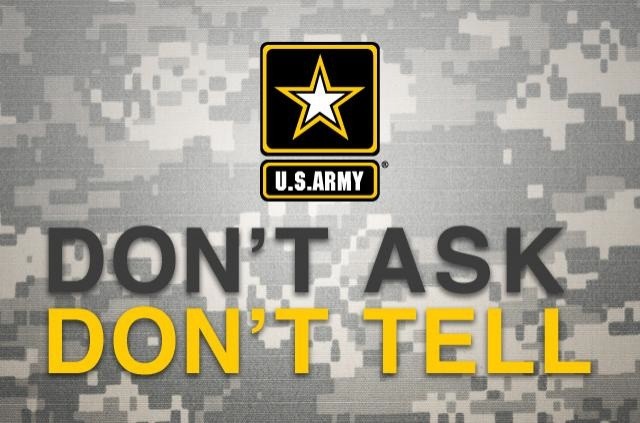WASHINGTON (Army News Service, Feb. 25, 2011) -- With pending repeal of the "Don't Ask, Don't Tell" law banning gays and lesbians from military service, the Army is implementing a tiered training program for Soldiers worldwide.
Army Chief of Staff Gen. George W. Casey Jr. and Secretary of the Army John McHugh sent a message Feb. 22, to the force about preparations to repeal the law.
"We are confident that you are up to the task, and that we can implement this change in policy by relying on the leadership, professionalism, discipline and respect for each other that have characterized our service for the past 235 years and remain at the core of the United States Army," Casey and McHugh said in the message.
Training for the Force is broken into three tiers. Tier one targets special staff and key individuals like chaplains, lawyers, and inspectors general. Tier two focuses on commanders and supervisors. Tier three will train the rest of the force and is scheduled to begin in early March.
"It is important to emphasize that the current policies remain in effect" for now, McHugh and Casey pointed out in the message. They said the DADT law will stay in place until 60 days after the president, secretary of Defense and the chairman of the Joint Chiefs of Staff certify that the repeal can be implemented "consistent with the standards of military readiness and effectiveness, unit cohesion, and military recruiting and retention."
They added that the repeal date will be widely publicized once it is decided.
Attached to the message was a list of the "Top 10 things Soldiers need to know" about the repeal of DADT:
1. Accessions & Separations Policies: Upon repeal, the Army will no longer separate Soldiers solely on the basis of homosexual acts, a statement that a Soldier is gay, lesbian or bisexual, or marriage to a person of the same sex. Statements about sexual orientation or lawful acts of gay and lesbian conduct will not be a bar to military service or admission to any accession program. Sexual orientation will continue to be a personal and private matter.
2. Standards of Conduct Apply Equally to Everyone: All Soldiers will be held to the same standard of conduct. All members are responsible for upholding and maintaining high standards of the U.S. Military at all times and in all places.
3. Personal Privacy: Commanders may not establish practices that physically segregate Soldiers according to sexual orientation. Commanders do have the discretion to alter billeting assignments to accommodate privacy concerns of individuals on a case-by-case basis where it is in the interest of maintaining morale, good order and discipline, and is consistent with performance of the mission.
4. Moral and Religious Concerns: There will be no changes regarding any Soldier's free exercise of religious beliefs, nor are there any changes to policies concerning the Chaplain Corps and its duties. The Chaplain Corps' First Amendment freedoms and its duty to care for all will not change. Soldiers will continue to respect and serve with others who may hold different views and beliefs.
5. Benefits: There will be no changes to eligibility standards for military benefits and services. The Defense of Marriage Act prohibits the Federal Government from recognizing any same-sex marriage, so same sex partners do not qualify as dependents for many military benefits and services. A same-sex partner should be treated the same as an unrelated third party (e.g. girlfriend, boyfriend). All Soldiers will continue to have various benefits for which they may designate any beneficiary regardless of relationship.
6. Equal Opportunity: Sexual orientation will not be placed alongside race, color, religion, sex and national origin as a class under the Military Equal Opportunity Program and therefore will not be dealt with through the MEO complaint process. All Soldiers, regardless of sexual orientation are entitled to an environment free from personal, social, or institutional barriers that prevent Soldiers from rising to the highest level of responsibility possible. Harassment or abuse of any kind, including that based on sexual orientation, is unacceptable and will be dealt with through command or inspector general channels.
7. Duty Assignments: There are no changes to assignment policy. All Soldiers will continue to be eligible for world-wide assignment without consideration of sexual orientation. Soldiers assigned to duty, or otherwise serving, in countries in which gay and lesbian conduct is prohibited will abide by the guidance provided to them by their local commanders.
8. Medical Policy: There are no changes to existing medical policies.
9. Release and Service Commitments: There will be no new policy to allow for release from service commitments for Soldiers opposed to repeal of DADT or to serving with gay or lesbian Soldiers.
10. Collection and Retention of Sexual Orientation Data: Sexual orientation is a personal and private matter. Commanders will not request, collect, or maintain information about the sexual orientation of Soldiers.
Related Links:
'Don't Ask, Don't Tell' remains in effect as Gates, Mullen tackle plan
'Don't Ask' repeal training set to begin


Social Sharing